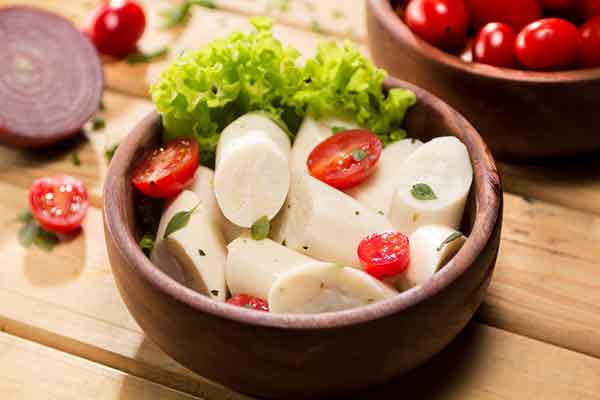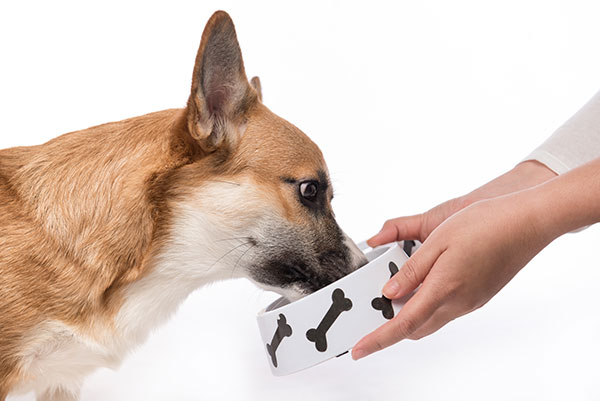Heart of palm, also known as palm heart or palmito de guandul, is highly prized for its dense nutritional profile.
The vegetable is chockfull of essential minerals and vitamins. It also boasts several antioxidants that can guard against various chronic diseases. Culinary versatility is another excellent thing to love about palm hearts. Palmito de guandul can be enjoyed raw or incorporated into a number of dishes.
Perhaps it’s due to the numerous health and nutritional benefits of palm hearts that some dog owners may want to share these veggies with their canine housemates. But can dogs eat palm hearts?
Fortunately, dogs can eat hearts of palm. These yummy vegetables do not contain any toxins known to cause immediate medical emergencies in canines. Besides, they’re loaded with many useful minerals, vitamins, and antioxidants. However, like many plant-based foods, hearts of palm are only safe and beneficial to dogs if served in moderation. You should only share these veggies with your pooch as an occasional treat.
Read below for everything you need to know about palmito de guandul for dogs.
Table of Contents
What Is Heart of Palm?
Heart of palm refers to a white vegetable obtained from the center of certain palm tree varieties.
Initially, palm hearts were harvested upon the death of palm trees. But with advancements in crop production technology, these vegetables can now be obtained without necessarily killing the entire palm plant.
Can Dogs Have Hearts of Palm? A Look at Palm Hearts’ Nutritional Profile
If you’re a dog owner with a taste for palmito de guandul, it’s not unusual to find yourself occasionally wondering – can my dog eat palm heart?
As we’ve already pointed out, palm hearts are perfectly safe and even nutritionally beneficial to dogs if served in moderation. But to fully understand the potential benefits of sharing palm hearts with your canine friend, you’ll need to start from the beginning by familiarizing yourself with the specific nutrients in these veggies.
A 3.5-ounce serving (roughly 100 grams) of palm hearts provides the following nutrients;
- Calories – 36
- Protein – 4 grams
- Carbohydrate – 4 grams
- Dietary fiber – 4 grams
- Fat – less than 1 gram
- Copper – 70% of the recommended daily value (RDV)
- Potassium – 38% of the RDV
- Zinc – 36% of the RDV
- Phosphorus – 20% of the RDV
The same serving amount of palm hearts contains varying concentrations of many other minerals. These include iron, calcium, magnesium, and various B-complex vitamins like vitamin B9.
Also, like most vegetables, palmito de guandul boasts several antioxidants.

What Are The Potential Benefits Of Palm Hearts For Dogs?
1. Palm Hearts May Support Digestion
Hearts of palm are high in dietary fiber, a nutrient noted for its diverse roles in aiding digestion.
Fiber supports digestion by adding weight to stool. This increases bowel movement frequency, thereby reducing the risks of constipation.
Dietary fiber also supports digestion by nourishing the useful microorganisms that inhabit your dog’s alimentary canal, also known as gut microbiome. Multiple findings have shown that nourishing the gut microbiome is a proactive way of guarding against certain digestive and metabolic disorders. Examples include leaky gut and inflammatory bowel disease (IBD).
2. Palm Hearts May Prevent Unhealthy Weight Gain
The relatively high fiber content in palm hearts is not only useful in supporting digestion. It can also help prevent unhealthy weight gain.
Foods rich in dietary fiber are known to produce feelings of fullness considerably longer after meals. Longer feelings of satiation translate to a low food drive.
Therefore, mixing palm hearts into your dog’s regular diet might help prevent weight gain from increased food intake.
3. Palm Hearts May Promote Muscle Development
Dogs, like all animals, require protein in their diets more than any other nutrient (except water). Protein is necessary for the healthy development of muscles and tissues.
While your pooch derives most of his protein requirements from animal products, it doesn’t hurt to supplement his diet with protein-rich plant extracts like palm hearts.
Besides supporting your dog’s muscle development, protein may also work in conjunction with dietary fiber to induce longer feelings of satiation after meals. The relative abundance of the two nutrients in palm hearts makes these vegetables all the more desirable in managing your dog’s weight. It’s even better when you consider that palmito de guandul is incredibly low in fats, calories, and cholesterol.
4. Palm Hearts Are Good For Blood Circulation
A 100-gram serving of palm hearts contains as much as 70% of the recommended daily intake of copper.
Although these RDV values are based on the human requirement of copper, we can still extrapolate them to dogs. That’s because humans and dogs have nearly similar nutritional needs and physiological functions.
Copper is involved in the formation of red blood cells. Therefore, supplementing your dog’s diet with copper-rich foods like palm hearts might help promote blood circulation. And increased blood circulation ramps up the supply of oxygen and essential nutrients to various body parts.
Copper is also useful in maintaining nerve cells and the immune system. Besides, the mineral can help manage blood pressure and high cholesterol levels.
5. Palm Hearts May Guard Against Chronic Diseases
Palm hearts are loaded with antioxidants. A notable mention is polyphenols.
Like all antioxidant compounds, polyphenols can neutralize the oxidative damage to cells caused by excess accumulation of free radicals in the body. This phenomenon is associated with reduced incidences of various chronic diseases.
Consuming foods rich in antioxidants is particularly effective in minimizing the risks of diabetes, cancer, and heart disease.
The following are other notable nutrients in palm hearts and how each one may benefit your dog;
- Potassium – Maintains electrolyte balance and regulates blood sugar.
- Zinc – Acts as an antioxidant while also aiding wound healing and cell division.
- Phosphorus – Promotes strong bones and teeth while also playing a role in protein synthesis.

Are Hearts of Palm Bad for Dogs?
We’ve already gone over several potential benefits of palmito de guandul for dogs. Based on the above-listed benefits, it appears like palm hearts may not pose any serious threats to your canine friend.
However, anything that has its pros also comes with some downsides. And when it comes to feeding plant-based foods to dogs, it’s important to familiarize yourself with all the dangers before incorporating such products into your dog’s diet.
How Might Palm Hearts Hurt Your Dog
1. Palm Hearts May Irritate Your Dog’s Tummy
Palm hearts are not a staple ingredient in canine diets. Therefore, these vegetables can easily cause gastric irritation if ingested.
Common symptoms to expect include;
- Vomiting or retching
- Diarrhea
- Dehydration resulting from diarrhea, usually marked by dry eyes or thick saliva
- Flatulence or gassiness
- Abdominal discomfort
The risks of stomach upset depend on your dog’s tolerance for palm hearts and the quantities consumed.
Dogs having palm hearts for the first time will almost always develop gastrointestinal symptoms. The same is true if the vegetables are fed to dogs in excess.
2. Palm Hearts May Trigger Allergic Reactions
Many dogs will instantly love the taste of palm hearts. But some may be allergic to these vegetables.
Symptoms of palm heart allergy in dogs will generally present as the gastrointestinal issues we’ve listed above. They may also include irritability, pacing, elevated heart rate, and labored breathing.
3. Palm Hearts May Mess up Your Dog’s Blood Sugar Levels
Hearts of palm are relatively high in carbohydrates. Unfortunately, canines do not require carbs in their diet.
Consuming worrying amounts of carbohydrates can cause blood sugar spikes in dogs. Without urgent interventions, your pooch might develop sugar-related conditions like diabetes.
The saving grace is that palm hearts are also high in fiber. Much of the fiber moves through the stomach undigested. In the process, it carries a significant amount of carbohydrates with it, preventing these carbs from getting absorbed into the bloodstream.
4. Palm Hearts May Harbor Pathogens
Palm hearts face the risks of bacterial and parasitic contamination as any other raw vegetable. These veggies are usually contaminated with C. botulinum spores.
A dog’s potent digestive juices may be somewhat effective in fighting C. botulinum spores. But ingesting these organisms in excess could trigger gastroenteritis or food poisoning.
5. Palm Hearts May Asphyxiate Your Dog
Asphyxiation is another potential downside of eating raw palm hearts. The fact that these vegetables come from one of the softest parts of the palm tree doesn’t make them safe to consume raw. And much less considering that dogs have smaller throats than humans.
Dilated pupils, hypersalivation, and light but persistent cough are the tell-tale signs that your dog could be choking on palm hearts.
6. Palm Hearts Are Not Nutritionally Complete Foods for Dogs
Despite their abundance of essential minerals and vitamins, hearts of palm still lack many nutrients that dogs require in their diets.
This underscores the importance of sharing palm hearts with your pooch in moderation. Better yet, you might consider other more nutritionally-useful alternatives.

What Is The Best Way To Feed Hearts Of Palm To Dogs?
1. Go for non-toxic palm hearts
Most palm heart cultivars are safe for dogs. But others, such as the heart of Orania sp., are highly toxic.
Therefore, it’s important to understand the toxicity of a palm heart before sharing it with your dog.
2. Choose non-bitter varieties
It’s not enough to investigate the toxicity of palm hearts before feeding them to your pooch. You’d also do well to establish the taste of these vegetables.
Again, most palm heart varieties are sweet. But bitter cultivars exist too.
2. Remove the outer sheath
Once you’ve honed in on a sweet and non-toxic palm heart variety, the first step in preparing the vegetable for your dog is to remove the outer sheath of the stem. Remember that the goal is to utilize the inner section.
Use a sharp knife to slice the stem longitudinally. This will cause the middle section of the heart to separate. Then, discard the covering and prepare the whole bottom part.
3. Wash the vegetable
Rinsing helps wash away any dirt and debris from freshly-harvested palm hearts. It may also eliminate some bacteria and parasites from the vegetable.
4. Chop the vegetable
Chopping palm hearts reduces choking risks. Depending on the intended preparation methods, you can chop, slice, or cube the vegetable.
5. Cook the vegetable
Heart of palm can be eaten raw or cooked. But when it comes to palm hearts for dogs, you’re better off cooking the vegetable first. Cooking softens palmito de guandul, making it easier for your dog to swallow and digest. However, avoid cooking palm hearts with too much salt, spices, fat, or butter.
Excess salt in a dog’s diet can cause kidney damage. Spices like onions and garlic are associated with a life-threatening disease called Heinz-body anemia, while fat and butter are major risk factors for weight gain.
In the same breath, avoid canned palm hearts, as these tend to be laden with salt, spices, and fat. If you must give your pooch store-bought palm hearts, check the ingredients list to rule out any potential toxins.
A commonly posed question by palm heart-loving dog owners is, ‘I’m wondering, is hearts of palm noodles safe for dogs?’
The safety of palm heart noodles depends on the specific ingredients in the food. That’s all the more reason to check the components of palm heart-containing foods before sharing them with your canine housemate.
6. Serve the vegetable to your dog in moderation
Since palm heart doesn’t constitute a dog’s primary diet, it’s best to serve it to your pooch only as an occasional treat.
This is the best way to minimize the adverse effects associated with the vegetable, such as gastric irritation, allergic reactions, and blood sugar spikes.
- Works as a dog food topper - For pet parents looking for an alternative to capsules, raw treats, or soft chews, all it takes is a few pumps of Salmon...
- A tasty & body nourishing treat for cats & dogs - Essential fatty acids for a healthy coat.
- Powerful Omega Fatty Acids - This premium fish oil liquid formula is loaded with the healthy Omega-3 fatty acid (with epa and dha) to support health...
Last update on 2025-01-15 / Affiliate links / Images from Amazon Product Advertising API
How Often Can Dogs Eat Hearts Of Palm?
We’ve repeatedly mentioned that palm hearts are safe for dogs only if served in moderation and as an occasional treat.
But the term ‘occasional’ can be highly relative. The conventional wisdom is to give palm hearts to your dog no more than twice a week.
Can Puppies Eat Hearts of Palm?
Puppies may benefit from hearts of palm the same way as adult dogs. However, you should proceed with extreme caution while feeding these veggies to your pups.
That’s because puppies have sensitive stomachs. Therefore, they’re likely to suffer more severe adverse effects from palm hearts than adult dogs.
Conclusion: So, Is Hearts Of Palm Safe For Dogs?
Hearts of palm are safe and useful to dogs, but only if fed sparingly and occasionally. Never replace your dog’s staple diet with palm hearts or other unconventional food products.
Checkout Our Favorite Dog Products
1. BEST PUPPY TOY
We Like: Snuggle Behavior Toy with Heart Beat & Heat Pack – Ideal toy for new puppies.
2. BEST DOG TRAINING PROGRAM
We Like: Doggy Dan The Online Dog Trainer – Stop any dog problem and raise the perfect puppy with The Online Dog Trainer.
3. BEST DOG PUZZLE TOY
We Like: Outward Hound Interactive Puzzle Toy – Every dog loves chasing squirrels at the park. The Outward Hound Hide-a-Squirrel Puzzle Toy gives your dog the same feeling as though he was outdoors chasing live squirrels.
4. Best Bone Broth for Dogs
We Like: (Solid Gold – Human Grade Bone Broth for Dogs) – Simmered Beef Bone Broth With Turmeric Provides A Nutrient-Dense And Flavorful Addition To Your Dog’s Meal + Rich In Natural Collagen From Beef Bones.
5. Best Multivitamin for Dogs
We Like: PetHonesty 10-For-1 Multivitamin – 10 Benefits in 1 Daily Treat – These Multivitamin Snacks combine a well-rounded blend of the most essential vitamins and supplements including glucosamine, probiotics, vitamins and omegas, for dogs’ overall daily health.


